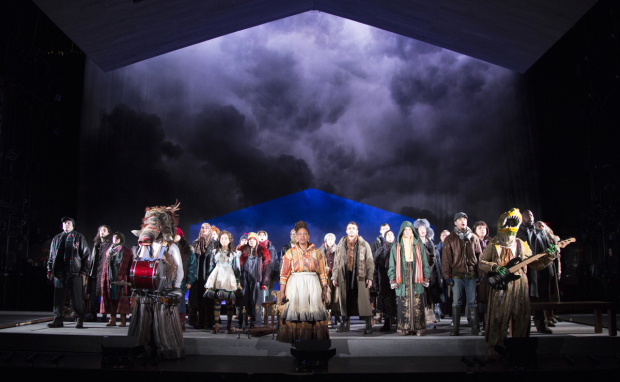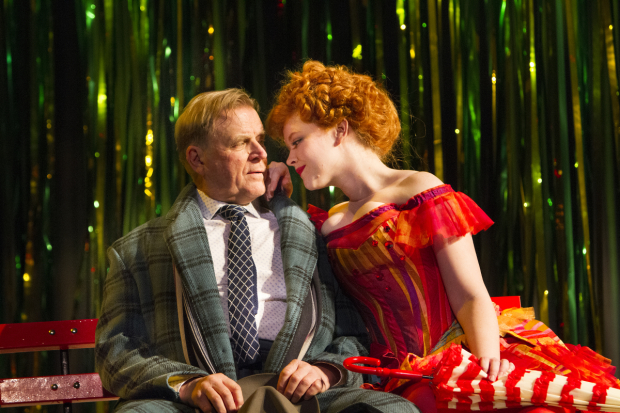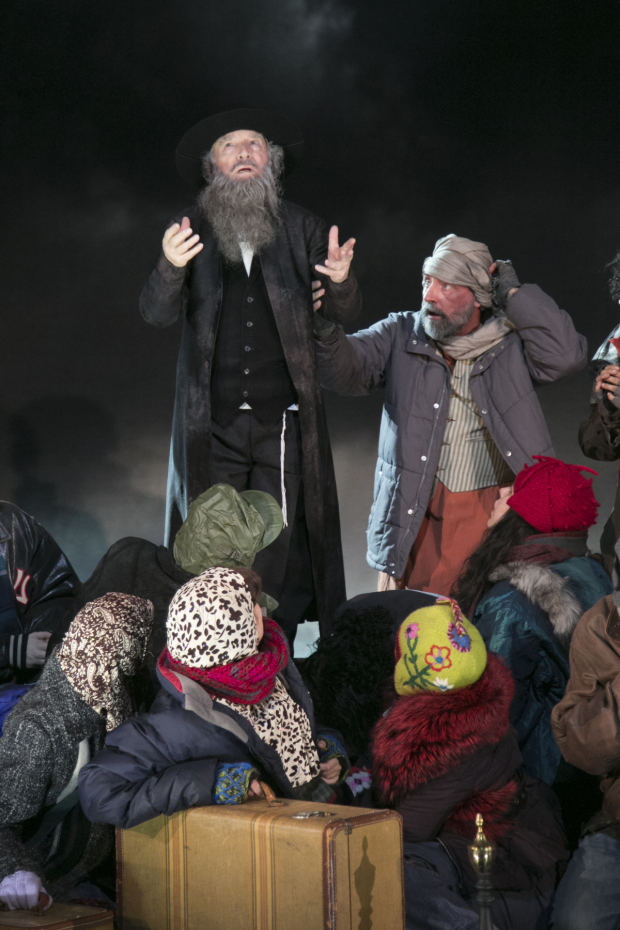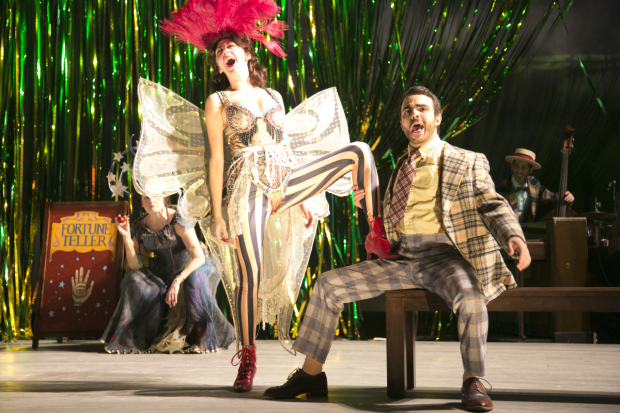The Skin of Our Teeth
Theatre for a New Audience mounts a massive revival of Thornton Wilder’s epic play about everything.

(© Henry Grossman)
"I'll say the lines, but I won't think about the play," says an actor in the middle of Thornton Wilder's The Skin of Our Teeth, "and I advise you not to think about the play, either." It's an uncommon plea from a serious playwright (and there are few more esteemed than the author of Our Town). It dares us to the do the opposite, lest we be considered unserious. But really, how seriously can we take a play with a collapsing set and a stage manager who regularly runs down to keep the show from completely grinding to a halt? It is one of the lasting enigmas of this classic of the American stage that you'll either love or hate.
That is especially true of the extravagant revival at Theatre for a New Audience's Polonsky Shakespeare Center. Director Arin Arbus leads a cast of 35 in a production that is as visually impressive as it is bizarre, two traits that feel about right for a play that attempts to encapsulate all of human history in three acts. Wilder has written that the play, which was composed in the lead-up to World War II, is most alive when performed under conditions of crisis. Viewers may disagree if our present moment constitutes a crisis, but Arbus' production is uncomfortably resonant either way.

(© Henry Grossman)
The play tells the story of George Antrobus (David Rasche), inventor of the wheel and other vital human accomplishments. He lives with his wife (Kecia Lewis) and kids (Kimber Monroe and Reynoldo Piniella) in Excelsior, New Jersey. Their opinionated maid, Sabina (Mary Wiseman), also lives with them. The impending ice age threatens to shatter their fragile existence, as Mrs. Antrobus urges her husband to focus on more practical things like food and shelter, rather than mathematics and the alphabet. Change is always imminent, taking the Antrobi to a mammal convention in Atlantic City and then back to Excelsior to celebrate the outbreak of peace after a long war.
Wilder was a contemporary of Bertolt Brecht and shared many of the German playwright's methods and interests, including a passion for breaking down the fourth wall and schooling the audience: "Oh, I see what this part of the play means now," Sabine says directly to us as a mass of shivering individuals gather outside the front door. "This means refugees." The refugees in this production carry modern luggage and some wear headscarves. Detractors might accuse Arbus of being unnecessarily heavy-handed in her reference to modern refugee crises, but considering that the original 1942 production featured a refugee Moses praying in Hebrew, one can safely say that Wilder was already pretty in-your-face — just like Brecht.

(© Gerry Goodstein)
Unlike Brecht, Wilder actually had a sense of humor. At one point, a dinosaur walks into the Artrobus living room and starts playing the piano. "Technical difficulties" occur throughout, requiring the intercession of the stage manager, Mr. Fitzpatrick (William Youmans). As Sabina, Wiseman gives the funniest performance of the evening. She is cheeky and sarcastic, constantly exposing the artifice of the play, just as Wilder intended.
Rasche strikes an impressively paternal figure as George, although he often undermines his authority by fumbling his lines. As portrayed by Lewis, we come to see Mrs. Antrobus as the real source of power and stability. She is imposing and severe, her focus always on survival for herself and her family. Crossing her arms and shaking her head, she is unimpressed with Mr. Antrobus' flights of fancy. She also expresses genuine fear for her son, who Piniella plays with a seething nihilist anger that feels completely of today.
César Alvarez of the Lisps has composed original music to underscore the show and for the cast to sing during act transitions. The songs are contemplative and bittersweet, perfectly setting the tone for us to consider what we've just seen. A chorale in which all 35 actors sing unaccompanied is one of the most stunningly beautiful moments in any New York theater right now.
Arbus helms a lavishly designed production, including a massive costume plot of fairytale patterns and mismatched plaid that cleverly captures Wilder's taste for anachronism (incredible work by Cait O'Connor). Marcus Doshi's vaudevillian lighting, which includes some well-placed footlights, is unapologetically theatrical. Over the course of the play, set designer Riccardo Hernandez depicts the collapse and reconstruction of the house in Excelsior, visually manifesting the human cycle of destruction and creation in two spectacular set changes.

(© Gerry Goodstein)
Near the end of the third act, Antrobus says to his wife, "You and I will remember in peacetime all the resolves that were so clear to us in the days of war. We've come a long ways. We've learned. We're learning." We breathe deeply, wishing he were right, but knowing he is not.
Not everyone will appreciate Wilder's idiosyncratic combination of philosophy and frivolity, which sometimes sags under the weight of its own hefty allegory. Still, it is impossible not to appreciate the work Arbus and her cast have put into this faithful revival, a rare opportunity to see this important work.









